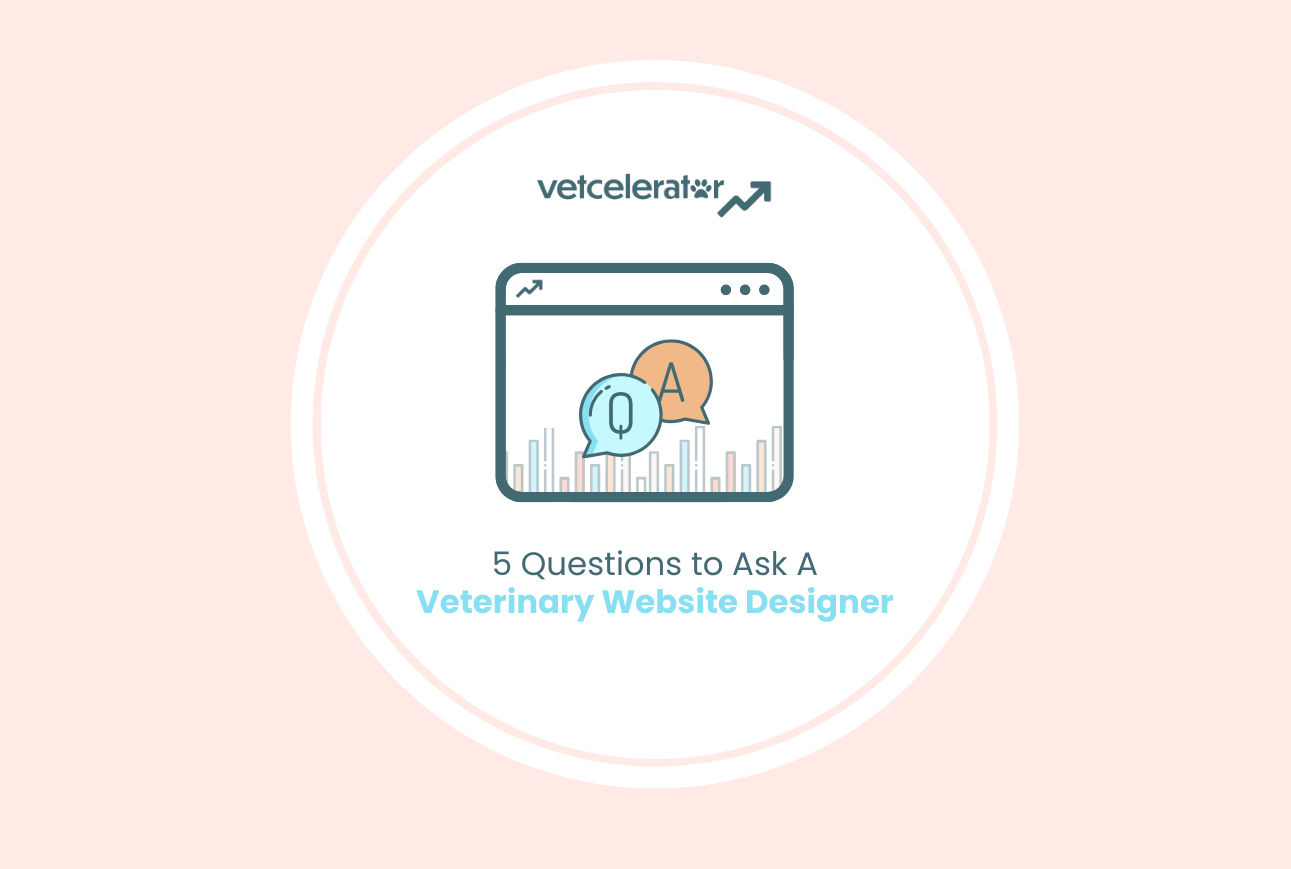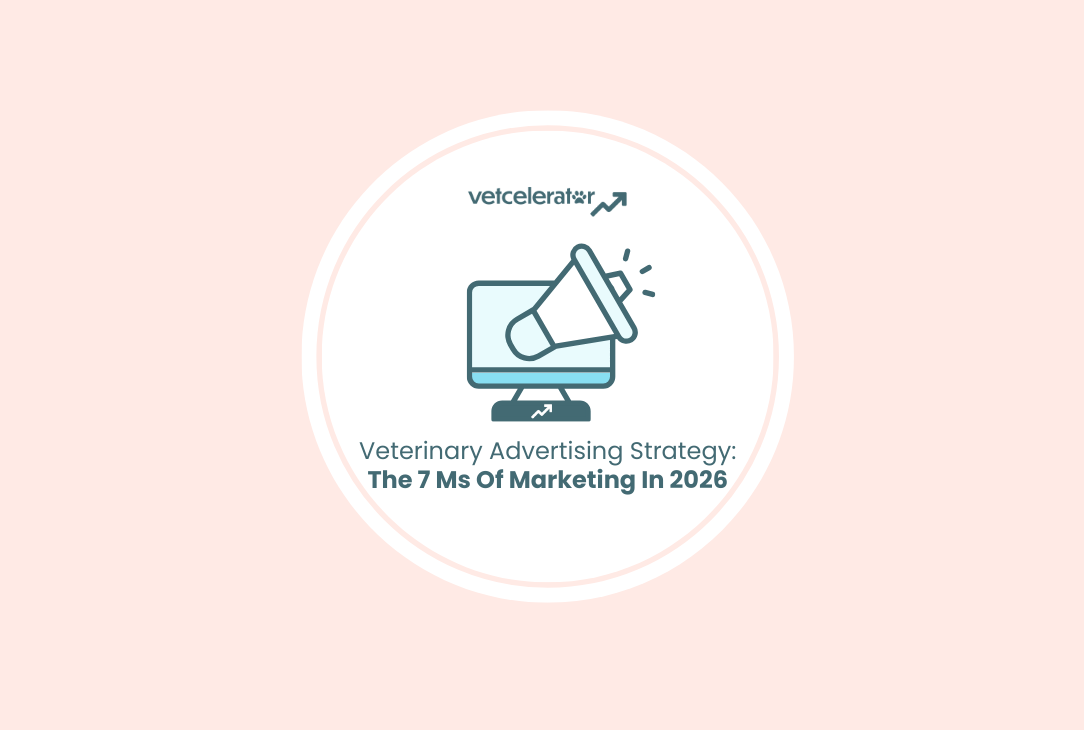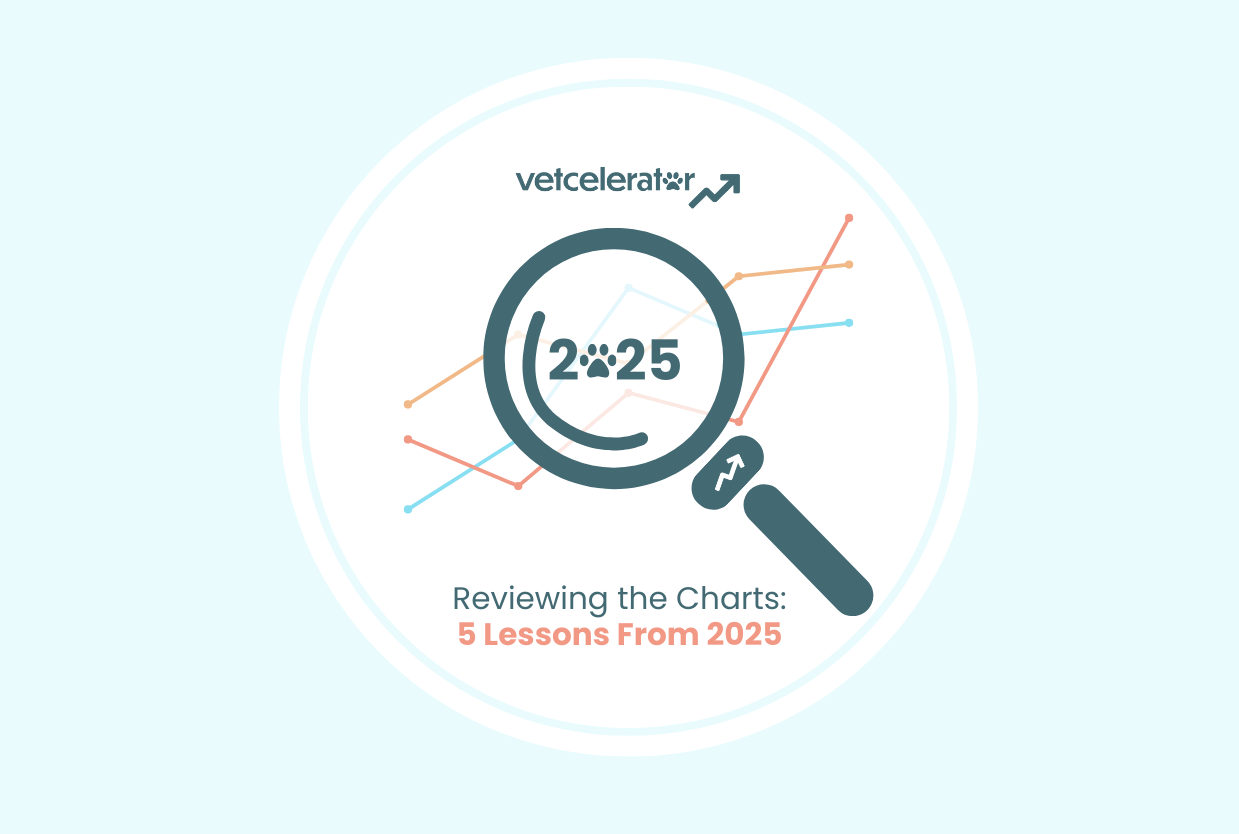
Choosing a website designer for your veterinary clinic isn’t just about aesthetics. It’s a strategic decision that affects your visibility, reputation, and growth. Before you commit to a partner, ask these five essential questions to clarify expectations, avoid common pitfalls, and set your digital presence up for success.
Jump to each question here:
- Does the Designer Have a Portfolio of Veterinary Websites?
- What is the Scope of Website Services?
- How Do You Measure the Success of A Veterinary Clinic’s Website?
- What Should I Expect During Website Onboarding?
- How Easy Is It to Transfer My Vet Clinic’s Domain and Emails Without Losing Anything?
Each of these questions reveals how well a designer understands the veterinary space, anticipates operational needs, and supports your clinic’s goals post-launch. Let’s walk through what to ask, and what to listen for.
1. Does the Designer Have a Portfolio of Veterinary Websites?
This may seem like a no-brainer, but it’s one of the most important questions you can ask. Even without any formal education in website design and digital presence trends, everyone generally knows what a good website looks like and what a bad one looks like. But because ‘good’ and ‘bad’ are still subjective terms, you need to make sure that you and the designer you’re interviewing are on the same page.
Every veterinary website designer should say ‘yes’ to this question and give you some examples of their work. Would you buy a pair of shoes without seeing them first to judge whether or not they’ll hold up to your needs? Just like footwear, the visual components of your website contribute to how someone perceives you, and the functionality of your website will be instrumental in attracting more clients to your veterinary practice.

Capable Compatibility
The designer that you choose needs to be capable of creating the type and style of website that you want. The functionality of a service-oriented website for veterinary businesses is vastly different from that of e-commerce websites, educational websites, etc., and design style is an added layer of compatibility that you’ll want to consider. If the designer that you’re talking to only has e-commerce websites in their portfolio when you run a service-centric business, or if the websites in their portfolio all look too busy (or too austere) to you, then you may not be looking at a good fit.

The Ideal Portfolio
A well-rounded portfolio, like Vetcelerator’s portfolio, will show you different design styles, showcasing a range of skills and an ability to produce a unique product for each client. Vetcelerator’s primary focus on websites for veterinarians and other pet-centric professions also indicates a level of specialization and product knowledge that can benefit your veterinary clinic.
2. What is the Scope of Website Services?
This is a broad question, but you’ll want to ask a veterinary website agency what they do and don’t do for the price of the service that they’re quoting. If all they do is design the website, and you need someone who will also host it, provide security, and offer post-launch support and maintenance (all of which we do at Vetcelerator), then you’ll need to keep looking unless you want to pay multiple companies or try to do it all yourself.

Veterinary Website Design
When it comes to design, there’s more to consider than just, “Do you like the way it looks?” Functionality is just as important, if not more so. Your website needs to be user-friendly, meaning it is:
- Easy to navigate
- Intuitive to find information and links on
- Responsive on screens of all sizes (especially mobile)
But design is only half of the battle. People need to find your website before they can explore it. Vetcelerator knows that every website has two audiences: the users visiting it and search engines, who are responsible for putting it in front of users.
This is where SEO and GEO come in.

Veterinary SEO/GEO
SEO, or Search Engine Optimization, is so much more than just keywords on your webpages. There’s a huge host of components that can contribute to a website’s online visibility, from navigation elements and site performance to metadata and backlinks, and then some.
You don’t need to be an expert on SEO for your veterinary website, but your website designer should be. Ask them to explain what their SEO strategy includes, what SEO components may come at an additional cost, and discuss with them the results you’d like to see for your website. They should be able to explain the ways their strategy will align with your goals within your budget.
If you really want to test a vet clinic website designer, ask them about GEO, or Generative Engine Optimization. GEO is the next evolution of SEO, an expansion of existing optimization guidelines as more and more internet users find information by searching through generative AI platforms, like ChatGPT, Google Gemini, Midjourney, Microsoft Copilot, etc.
Vetcelerator is forward-thinking about trends and content-consumption behaviors so we can maintain your veterinary clinic’s relevance online. Through common keyword use, technical SEO, and routine site audits geared towards optimizing performance, we’ve got you covered.

Veterinary Website Hosting, Security, and Maintenance
Oftentimes, hosting, security, and maintenance are a package deal, but it’s always smart to confirm rather than assume. When interviewing a veterinary clinic website designer, you can ask them questions like:
- What happens if the website goes down?
- What communication can I expect throughout the process?
- Are you regularly backing up website files?
- What security features are in place?
- What website health, optimization, and maintenance processes are in place?
- Are you scanning for malware to minimize or avoid downtime in the first place?
You should also ask if they are able to host your domain and your emails in addition to your website (more about that in question five).

Post-Launch Support And Updates to Your Website
To most website designers, ‘post-launch support’ simply means standard maintenance, and any updates to your website’s content come with an added expense, often a cost per hour to make the requested changes.
At Vetcelerator, post-launch website support means business support. We believe that your website updates, such as staffing changes and edits to your hours of operation, are part of maintaining your website, and we’re happy to perform those at no additional charge.
Clarifying in advance what you can expect from your website designer over time is important for the long-term health of your website and, in turn, your digital presence. A successful relationship with your website designer begins with understanding and aligning each other’s expectations.
3. How Do You Measure the Success of A Veterinary Clinic’s Website?
The goal of a website shouldn’t be just to have one. A website is a marketing tool, so it’s important to think about your website in terms of criteria for successful marketing.

What Is Success?
The information potential clients use to choose between two competing veterinary practices might boil down to pricing, reviews, or even how they’re treated on the phone. First impressions are important, and a website can help establish your brand as a veterinary clinic. You’re selling your brand as much as you’re selling your services.
So, before you ask a veterinary website developer how they measure the success of the websites they create, ask yourself how you would measure success. What do you want your website to do for you? Is success for your website:
- Conveying the broad range of services that you offer?
- Exhibiting your sincere dedication to high-quality customer service?
- Getting more customers to fill out onboarding forms prior to their appointments?
- Increasing the visibility of your online presence?

Align Your Expectations
Once you know what you want to get out of your website, ask the website designer what their idea of success is. If they don’t turn around and ask you the same question in return, chances are that they won’t be able to tailor your website to meet all of your needs.
At Vetcelerator, the success of the websites we create is typically measured by tracking user interaction with features like online booking and form-fills, and creating user-friendly content and navigation. Certain standards for performance, such as page load speed, must also be maintained. We provide our clients with a dashboard where they can keep an eye on data-centric metrics themselves, if they want to.
But for our website team, success always starts with client satisfaction with the website we’ve created and the ways it’s benefiting your veterinary business.
4. What Should I Expect During Website Onboarding?
Not everybody needs or wants to know ‘how the sausage is made,’ so to speak, but knowing the general outline of the project’s steps is instrumental in choosing a veterinary website designer.
If you have a particular date that you need your new website to be ready by (or if you have yet to negotiate with your old website hosting provider), communicate this to the designer you’re interviewing to make sure that the expectations for delivery are what you need them to be.
Vetcelerator outlines the steps of the process in our onboarding kickoff meeting, so that you’ll know exactly what we need from you, and when.

Your Involvement Level
Some veterinary practice website designers only want basic information. Vetcelerator believes it’s important to get to know our clients, their priorities, and the character of their business before we begin the creative process. This means we like to involve our clients as much as they’re comfortable with by:
- Asking for digital assets, like logo files, staff photos & bios, pictures taken in the clinic, etc.
- Running through a list of services and specialties
- Discussing what topics are most important, like dental health or parasite prevention
- Reviewing online forms, contact information, color palette, design style preferences, clinic culture, website goals, and more
We also have several steps for client review along the way before a website is set live.

Communication
An absence of communication is fertile soil for misunderstandings and missed opportunities. To better lay the groundwork for timely, constructive communication between you and your website designer, ask them about frequency of project updates, how quickly they’ll need responses if they have follow-up questions, and what their turnaround time is for scheduling a video call when one is requested.
During a Vetcelerator kickoff call, we will gather all necessary contact information and discuss the best methods for reaching out with questions, including the Client Portal.

Timeline for Completion
“How long will it take to build my website?” is a major question. The answer to this question can depend on the steps in the website designer’s process, the complexity of your project, upcoming holidays that may mean time off in the middle of your project, and the backlog of other projects they may be working on for other clients.
Regardless of what sort of timeline a veterinary clinic website designer responds with, you want to make sure it meets your needs. If you have an existing website and need to give a minimum of 30 days’ notice before leaving your existing designer’s services, then knowing the timeline for the new website build will allow you to wait an appropriate amount of time before you cancel your existing one.
Our Vetcelerator website team wants to make sure that the transition of your digital presence to our care goes smoothly. We’re happy to explain our timeline for success and to work with you to find an agreeable solution if we discover hiccups in that timeline.
5. How Easy Is It to Transfer My Vet Clinic’s Domain and Emails Without Losing Anything?
This may seem like a narrow-focused question in the face of the other questions addressed here, but it’s one that the Vetcelerator website team gets frequently.

Transferring Your Website Domain
Transferring a domain is a relatively easy process, but it’s one that varies depending on your circumstances. To answer this question, a website designer will likely need to know through which registrar your domain was purchased, who currently has ownership of your domain, and (if it’s another website designer) what their offboarding process is.
If you’re not particularly tech savvy (or even if you are), Vetcelerator offers to assist with the process, from screen sharing in a video call to walk you through the transfer to giving you advice on how to approach a difficult former service provider.

Transferring Your Emails
Once again, this process is dependent on your specific circumstance. Where your emails are currently being hosted determines whether it’s as simple as your new website designer gaining access to your existing account or if a more complex migration is required. Knowing who currently has admin access is another key piece of the equation. Regardless of the difficulty of the task, the veterinary website designer you’re interviewing should offer to assist with transferring your emails.
Vetcelerator will work with your veterinary practice, so you don’t need to worry about losing any information. Then, once your emails are moved to our management, we provide support for any technical issues that may arise.
Knowledge Is Power!

There are a million and one things to think about and keep track of when you’re thinking about building a new website. A good website designer will keep track of them for you, so you can focus on the day-to-day of running your veterinary practice. When interviewing a website designer for veterinary clinics, make sure that the answers they give you leave you feeling confident about their ability to manage the project and create something that represents your business well.
You deserve to feel excited about the prospect of a new website and the ways it can benefit your veterinary clinic, and you deserve a website designer (like Vetcelerator!) that you can trust. If you are a veterinary practice owner or manager in need of a new website, get started with a free marketing audit.




